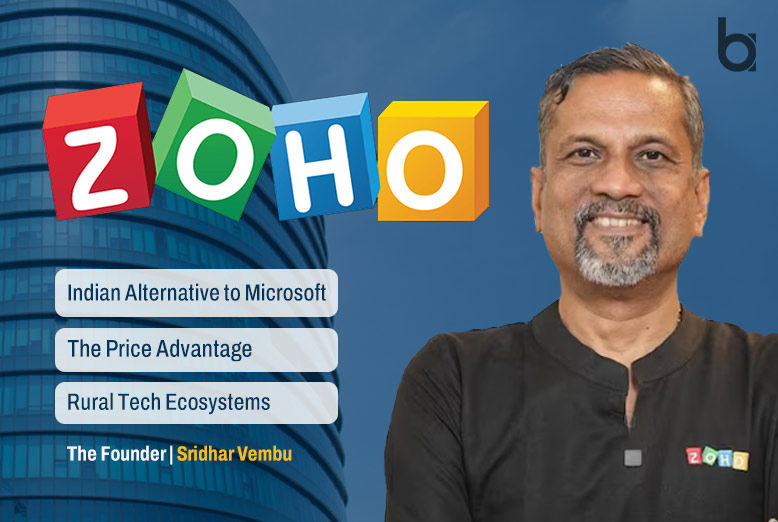Have you ever felt caught in a software tug-of-war, choosing between the massive, established giants and the fresh, innovative challengers? Well, the entire tech landscape is feeling that pull right now! We’re witnessing a profound shift where businesses, especially here in India, are looking beyond the usual suspects.
This isn’t just about swapping one set of tools for another. It’s a complete rethink of everything—company values, cost, and even national pride. The years leading up to 2026 are set to be a turning point, and at the heart of this revolution is an Indian tech titan you need to know about: Zoho. It’s emerging as a powerful, and often smarter, alternative for businesses ready to embrace a new way of working. Let’s dive into this incredible story.
Let’s Explore How Zoho Is Emerging as the Indian Alternative
1. The Philosophical Divide: Shareholder Value vs. Stakeholder Value
Ever wondered what really separates a company like Microsoft from Zoho? It’s not just the software; it’s their soul. Their core philosophies are worlds apart, and frankly, it’s fascinating.
- A Different Kind of Growth:
While many tech giants are obsessed with sky-high valuations and gleaming office towers, Zoho is pouring its heart into villages and skills. Sridhar Vembu, the CEO and co-founder, has crafted a state-of-the-art tech company that feels refreshingly old-fashioned in its values. What a concept!
- “Transnational Localism”:
This isn’t just a fancy buzzword. It’s Vembu’s vision in action. Zoho actively helps employees buy homes and become part of their local communities. It’s all about building bridges and fostering deep roots, not just concrete walls.
- The Power of Staying Private:
Get this—Zoho has achieved incredible success by completely avoiding venture capitalists. By staying private, they’ve been able to pour money into research and development instead of flashy marketing, letting them offer amazing product bundles at killer prices.
- A Human-Centric Approach:
Vembu has been refreshingly honest about the dark side of intense work culture, warning against the loneliness and stress that plague many employees. It’s all about long-term thinking over short-term burnout.
- Nation First:
It’s a rare and bold stance for a global company. Vembu truly believes in putting the nation first, blending local impact with global knowledge.
- A New Chapter in Leadership:
In a significant move in January 2025, Sridhar Vembu transitioned from CEO to Chief Scientist, dedicating himself fully to R&D and rural development. Wow! The leadership torch was passed to an incredible team:
- Mani Vembu, Sridhar’s brother and a developer since 1996, stepped up as CEO of the Zoho division.
- Co-founder Shailesh Kumar Davey became the CEO of the parent Zoho Corporation.
- Co-founder Tony Thomas continues to lead U.S. operations.
- Rajesh Ganesan heads ManageEngine, the IT management software division.
2. The Ecosystem Showdown: A Unified OS vs. Powerful Silos
When it comes to the actual tools, this is where the battle gets real. Zoho isn’t just building apps; it’s building a universe.
- The Zoho One Dream: Imagine having one single, unified system for your entire business. That’s the promise of Zoho One. It’s built to replace the messy patchwork of different software that so many companies struggle with. Its CRM doesn’t just “work with” other apps; it’s seamlessly integrated from the ground up.
- A 29-Year Journey: Zoho has been in this game for 29 years, not just chasing trends but solving real business problems with a laser focus on customer support and privacy. And guess what? No ads. Ever.
- Beyond Productivity: While Microsoft 365 and Google Workspace are great for communication, Zoho One goes way, way further into automation.
- “Contextual Intelligence”: This is Zoho’s genius take on AI. Instead of generic AI, they are building their own Large Language Models (LLMs) and smaller, targeted AI models. This means the AI is deeply embedded within the context of your business, making it incredibly relevant and effective. They recently even expanded their Zia AI platform with new tools like Zia Agent and Agent Studio. That’s super-impressive, isn’t it?
And when Zoho says updates, they really mean it. Hold on to your hats, because the list of enhancements for Zoho People from October 2025 alone is mind-blowing.
Here’s just a peek:
- Overtime Tracking Made Easy: A new policy tracks every kind of overtime imaginable—daily, weekly, weekend, and holiday—based on time logs.
- U.S. Compliance Covered: Pre-configured overtime policies for all 50 U.S. states and 2 territories. Problem solved!
- Smarter HR: From a centralized “operations tab” in the HR Help Desk to a handy Holidays Gallery and a new Dubai sick leave policy, the updates are incredibly detailed.
- AI-Powered Insights: “Ask Zia,” the AI assistant in Advanced Analytics, now lets you ask questions in plain English to generate instant reports. How cool is that?
- WhatsApp Integration: You can now get real-time HR notifications sent straight to your WhatsApp.
- An Avalanche of Enhancements: Seriously, the list goes on and on, covering everything from KRA weightages and webhook enhancements to SCORM compatibility, new pulse surveys, e-signature appraisal letters, and even an “Ask Your Manager” category in the HR Help Desk. They’ve tweaked, improved, and added features to nearly every corner of the platform.
The Zoho Desk Spring 2025 updates were just as exciting, sharpening the AI-powered Zia to be more nuanced and introducing Guided Conversations to route customers to solutions intelligently.
And what’s the big picture? At Zoholics 2025, Mani Vembu laid it all out. Zoho is making a major shift towards enterprise solutions, but in its own unique way. They’re focusing on organic growth, word-of-mouth, and creating industry-specific apps for underserved markets. With the upcoming Vertical Studio, they’re even empowering partners to build their own scalable apps.
Finally, the Zoho CRM Q1 2025 update brought a beautifully streamlined UI, new “Team Spaces” for better organization, and powerful integrations with WhatsApp, Line, and Microsoft Teams.
3. The TCO Battle: Unmasking the True Cost of Ownership
Okay, let’s talk about the bottom line. What about the price tag? This is where Zoho really throws down the gauntlet, especially for Indian businesses.
- The Price Advantage: Straight up, Zoho’s pricing can be up to 50% cheaper than Microsoft 365. That’s a huge deal, particularly for companies that need a whole suite of applications.
- Serious Savings: When you factor in lower subscription fees and the seamless integration (which cuts down on hidden costs), businesses can expect to save anywhere between 20% and 50% in total ownership costs.
- Scalable for Everyone: Zoho’s subscription model is built to grow with you, making it accessible whether you’re a tiny startup or a growing enterprise.
Let’s put it into perspective with a quick look at a hypothetical 50-employee Indian company:
| Feature/Cost Category | Zoho One (50 Employees) | Microsoft 365 (50 Employees) |
| Subscription Pricing | Up to 50% cheaper, especially with bundled applications | Higher base subscription fees |
| Integration Costs | Lower, due to an integrated business suite (e.g., Zoho One) | Potentially higher for integrating disparate apps (e.g., Microsoft 365, Dynamics 365) |
| Customization & Development | Cost-effective solutions, extensive customization capabilities | Can incur significant development costs for bespoke solutions and complex integrations |
| Training & Adoption | Generally lower due to unified interface and ecosystem | Potentially higher due to disparate systems and specialized training needs |
| Maintenance & Support | Unified support, potentially reducing overall maintenance overhead | Can be fragmented across different products and services, leading to increased support costs |
| Hardware/Infrastructure | Primarily cloud-based, reducing local infrastructure needs | Desktop applications can require more robust local hardware, though cloud options exist |
| Total Ownership Cost | 20-50% savings compared to Microsoft, particularly for multiple app usage | Higher, due to cumulative costs of subscriptions, integrations, and potential add-ons |
| Add-on Costs (Microsoft) | N/A (more comprehensive suite by default) | Separate licensing for advanced security, compliance, and analytics (e.g., Microsoft 365 E5). |
| Security Features | Built-in customization of security and privacy within apps | Enterprise-grade security with advanced features and compliance capabilities |
My Opinion
Well, I can tell you that Zoho’s ascent is anything but a happy accident. This isn’t just about being a “cheaper alternative.” What we’re witnessing is a masterclass in sustainable, long-term strategy.
Zoho has tapped into a deep, global craving for software that is not only powerful and integrated but also principled. Their rejection of the VC-fueled growth-at-all-costs model in favor of a stakeholder-centric, locally-rooted philosophy is resonating powerfully in today’s market. Microsoft is, and will remain, a formidable giant.
But Zoho isn’t trying to beat Microsoft at its own game. It’s creating an entirely new one, built on the foundations of financial prudence, deep R&D, and an unwavering commitment to its community. It’s no longer just an alternative; for many, Zoho is becoming the benchmark for a new, more conscious way of doing business.
Here are the Future Impacts of Zoho’s Journey
● The Dawn of “Rural Tech Ecosystems”:
Forget isolated offices. Zoho’s model could ignite self-sustaining tech hubs in smaller towns, effectively reversing urban brain drain and rewriting India’s economic geography.
● Challenging the Silicon Valley Playbook:
Zoho’s continued success as a private, bootstrapped behemoth could inspire a new wave of startups to prioritize profitability and sustainable growth over flashy funding rounds and quick exits.
● Making Data Sovereignty a Core Feature:
In an era of rampant data privacy concerns, Zoho’s commitment to local data centers could become a primary selling point, influencing how businesses and even nations approach data security.
● Redefining Corporate Responsibility:
“Transnational localism” isn’t a side project; it’s Zoho’s core business model. This could compel other global corporations to move beyond PR-friendly initiatives and genuinely integrate community value into their operations.
● Democratizing Enterprise Software:
Through platforms like Vertical Studio, Zoho is giving developers the tools to serve hyper-specific “micro-vertical” industries that larger players have long ignored, potentially unleashing a torrent of niche innovation.
Share the Inspiration!
This story of homegrown innovation and thoughtful business is too powerful to keep to yourself. If you were inspired, surprised, or just plain impressed by Zoho’s incredible journey, do me a favor and share this blog with your friends, your colleagues, and on your social media. Let’s spread the word!







